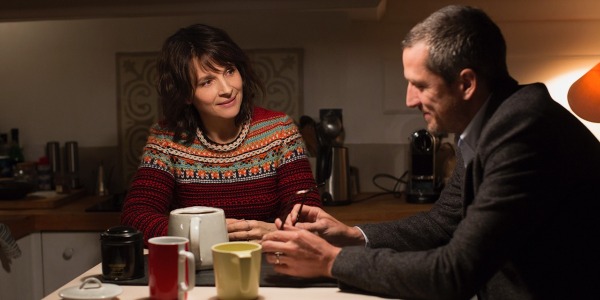The only thing worse than scoring third base whilst watching a Michael Haneke joint, according to Olivier Assayas‘ Non-Fiction, is the act of bragging about it, an erroneous error that entangles an inner-circle of aristocratic friends in this surprisingly composed contemplation about the digital revolution distilled within the prisms of the Parisian publishing world.
Non-Fiction – or Double Lives or E-Book or whatever title may be upon its final release – is a near two hour series of candid conversations dissecting the modern machinations of the literary world and how commerce – in all of its definitions – has configured its present state, reflecting the generational shift between the people who inhabited libraries and those who carry them within their pockets. This may sound as dull as dishwater to most movie-goers, but within the capable hands of Assayas, who wears the wardrobe of Woody Allen for this venture, this is a character comedy with more on its mind than it’s cunning premise may promise.
From Paperbacks to Kindles
Those who first heard of Assayas through Personal Shopper may be disappointed with this follow-up, as the only spectre haunting the key characters this time is the persistent spirit of the printed press, where leather-bound volumes of fiction have evolved into a multitude of beasts; blogs, social media posts (“Twitter is the modern day Haiku” is mused early on) and e-readers, the harbingers of a new technological wave that challenges the business and beliefs of conservative book publisher Alain (Guillaume Canet, who is also featured in AFF’s Sink or Swim).

It’s not just the shifting times that cause him concern, he’s just had to reject the latest manuscript from his long-time client Leonard (a perfectly dead-pan Vincent Macaigne), appropriately titled “Full Stop”, due to its sexist slant and the shroud of controversy that’s actively pursuing the washed-up writer. Not a radio interview or a book signing can go by without people aggressively noting his knack for mining real situations for material – often without their permission. His novels, or “auto-fiction” as he frequently redresses them as, are filled with controversial admissions including short-lived affairs with noted television personalities that are thinly veiled by lousy cover names, a swap made obvious when the book’s protagonist is also named Leonard.
With his latest effort, Leonard roughly cloaks a confession about his 6 year affair with Selena (the always dependable Juliette Binoche), the wife of Alain and noted TV actress, whose work on a low-rent cop series is slowly physically and mentally crushing her . She’s quick to discern the book’s true-life origins, including a blowjob during a screening of Star Wars: The Force Awakens that Leonard has retold as occurring during Haneke’s The White Ribbon, a baffling decision which causes another wave of contention to come crashing down upon his drooping figure, whilst his loyal wife (Nora Hamzawi) softly supports him when she can.
Textbook Farce
Once past its sophisticated first act, it naturally eases into the cultured character comedy that Velvet Buzzsaw tried so desperately to be (albeit without any paint-related murders of course). As Assayas’ script navigates through the professional and personal lives of his close-knit quartet, many questions and topics of debates are raised and tossed off in equal measure – if the way we consume art affects our interpretation of it, internet piracy, how bot-driven algorithms generate popularity, even down to the repetitive nature of modern cop shows, as Selena constantly insists that she’s not playing a cop, but a crisis management expert, a fun running gag that only sharpens the film’s revisionist-screwball Baumbach flavour.
Being presented within the more palatable medium of film (instead of a novel, where it’s meta-qualities would increase ten-fold), its easy to see each argument or point of concern about the world of book publishing being mutually applied to Hollywood itself. Replace books with films, the printed press with the cinematic experience and the shift towards e-books with Ipads, and it creates a virtually similar, but still relevant, rumination about the future of film distribution – the same conversation that Steven Spielberg recently kick-started and copped a lot of (in my eyes, unwarranted) flack for.
With multiple decades of arthouse titles under his belt, it’s hard not to discern that Assayas was intently aware of these dual meanings. Hell, even a brief exchange between Alain and Laure, where they barb about the tragic role that the critic plays within this new transforming system, feels directly targeted at people like myself, especially when Laure pointedly remarks that “algorithms are going to take over smug critics”, a true dig at the art critic community smuggled within a tragic omen of what’s likely to come for us all.
Non-Fiction: Conclusion
For a clumsier director, this could’ve become a overwrought drama about literature’s digital transition, filled with fist-shaking monologues about the necessary value of the written word, where Alain and Selena’s simultaneous affairs would’ve acted as convenient ticking time bombs, ready to explode when the narrative calls for another cheap injection of drama.
This is not the case with Non-Fiction, an increasingly rare type of drama, a film which has no concerns for any traditional structure, an ironic twist considering the state of its protagonists – this isn’t a comedy made to fill multiplexes, but those few who do fit within its observational grooves, will be rewarded with a satisfying cerebral serenity.
What do you think of Olivier Assayas’ filmography? Let us know in the comments below!
Non-Fiction will be playing at the Australian Alliance Française French Film Festival this year, details about upcoming sessions can be found here.
Does content like this matter to you?
Become a Member and support film journalism. Unlock access to all of Film Inquiry`s great articles. Join a community of like-minded readers who are passionate about cinema - get access to our private members Network, give back to independent filmmakers, and more.